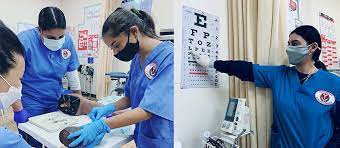Since there is no “typical” nursing position, you can tailor your nursing career to your interests, skills, and preferences. It is common for those interested in becoming nurses to seek licensing as either RNs vs. LPNs. An important question to ask yourself as you get ready to become a nurse is: which is better, LPN vs. RN? Both licenses are crucial to healthcare, yet there are significant differences between the two.
This article compares and contrasts the two types of licenses, RN and LPN, to highlight their distinctions. The following is a comparison of the education, employment, and compensation requirements for a licensed practical nurse (LPN) and a registered nurse (RN).
LPN VS RN
An LPN is a general nurse who works under the supervision of an RN and performs basic nursing responsibilities. They may be known as licensed vocational nurses (LVNs) in some states and do many of the same activities as certified nursing assistants (CNAs). An LPN may choose to specialize in one of the following areas:
- Pharmacology
- Correctional health care
- IV (intravenous) treatment
- Great care
- Palliative and hospice care
- Long-term care services
What is a Registered Nurse?
A registered nurse (RN) is a highly trained nursing specialist. They undertake numerous parts of a patient’s examination, care, and treatment while working under the direction of a physician. RNs might opt to specialize in a variety of areas, including:
- Intensive care
- Surgery
- Nursing care for the elderly
- Oncology psychiatry
- Nursing care for dialysis patients
- Neonatal care
“The differences between an RN and an LPN are in their educational requirements, licensure, and scope of practice. LPN education is generally shorter, decreasing the barrier to entrance into the career area but limiting the LPN scope of practice. RNs, on the other hand, have longer education programs and, as a result, a broader area of practice, giving RNs more independence in the workplace.”
LPN VS RN Duties
Understanding RN vs. LPN duties begins with understanding the scope of practice for each profession. The scope of practice refers to the practices and professional obligations that registered nurses and licensed practical nurses are legally permitted to perform under state law.
RN and LPN licensure specify the area of practice for each type of clinician based on their education, experience, and training. Keep in mind that each state has its own Nurse Practice Act, so the scope of practice for RNs and LPNs may vary significantly from state to state.
LPN Duties
LPNs can undertake a variety of tasks, including the following:
- Taking and recording vital signs
- Oral medicine distribution
- Taking blood sugar readings
- Ambulating, support with daily life activities (such as dressing, eating or drinking)
- Bathing and toileting assistance
- Other patient care and comfort responsibilities
RN Job Responsibilities
RNs and LPNs share several responsibilities. An RN’s scope of practice, on the other hand, is larger and includes additional duties such as:
- Patient evaluation
- Starting IVs
- Dispensing oral and intravenous drugs
- Taking blood samples
- Physical examinations
- Performing numerous diagnostic tests
- Patient and family education
- Collaboration with physicians to develop patient treatment plans
- Patient consultation
LPN VS RN: Scope of Practice
The expanded role of registered nurses is a direct result of the higher educational requirements for RN licensing. In contrast to licensed practical nurses (LPNs), registered nurses (RNs) have the authority to work autonomously in the majority of healthcare settings.
Additionally, RNs provide superior patient care, frequently providing either 1:1 (one nurse to one patient) or, in exceptional cases, 2:1 (two nurses to one patient) care. On medical-surgical nursing units, registered nurses often care for four to seven patients simultaneously.
Registered nurses see more patients in a given shift than LPNs do due to the lower acuity of the patients they care for. In shifts at senior care facilities, licensed practical nurses (LPNs) often care for twelve patients at once, and some have even reported caring for thirty.
Salary LPN VS RN
An LPN may expect to earn an average of $59,878 per year in the United States. Experience, geographic region, and type of employer can all affect salary levels. In most cases, LPNs can expect a better salary if they have advanced education. On average, LPNs may expect a $7,885 boost from overtime pay.
Annually, registered nurses earn an average of $92,734. Location, specialty, employer, and years of experience are some factors that could affect a salary. On the other hand, RN case managers make an average of $80,245 a year, whereas operating room nurses make an average of $156,726. The average overtime pay for a licensed practical nurse is $11,500. Health insurance, paid vacation, and tuition reimbursement are just a few of the benefits that registered nurses and licensed practical nurses may be eligible for.
LPN VS RN VS BSN
The idea that every nurse is the same is widespread but incorrect. But that’s not how it is. The duties and expertise required by various subspecialties in nursing are distinct from one another. Learning the differences between an LPN, RN, and BSN is essential if you aspire to enter the nursing profession.
Licensed practical nurses are known as LPNs. This is a license that a regulatory body, such as a state’s nursing board, issues to professionals.
Another name for a registered nurse is an RN. This is a license that a regulatory body, such as a state’s nursing board, issues to professionals.
Undergraduates who pursue a Bachelor of Science in Nursing degree are known as BSNs. A professional license is different.
A Brief Definition of LPNs
LPNs are licensed healthcare professionals who work under the supervision of registered nurses (RNs) and physicians. They often perform basic bedside care such as monitoring vital signs, providing medication, changing bandages, and aiding patients with personal hygiene.
LPNs typically finish a one-year vocational training program and must pass a national licensing exam (NCLEX-PN) before practicing. LPN programs result in a certificate or diploma rather than a college degree.
What Exactly is an RN?
RN is an abbreviation for registered nurse. Registered nurses (RNs) are certified healthcare professionals who provide patient care, educate patients and their families about various health concerns, and manage other healthcare personnel, such as LPNs and nursing assistants. Registered nurses can work in a range of healthcare settings, including hospitals, clinics, long-term care institutions, and home healthcare.
RNs must pass a national license exam after completing a two-year associate degree program (associate degree in nursing) or a four-year bachelor’s degree program (BSN) in nursing.
What is BSN?
BSN is an abbreviation for Bachelor of Science in Nursing. A Bachelor of Science in Nursing (BSN) is a four-year undergraduate nursing degree program that prepares students for a career as a registered nurse.
BSN programs include courses in leadership, communication, and research, as well as a more in-depth education in nursing theory and practice. BSN-educated nurses are more qualified to provide advanced patient care and may have greater prospects for promotion than RNs with associate degrees or LPNs.
What Can an RN Do That an LPN Cannot?
- LPNs are often able to insert IVs and draw blood for lab tests.
- LPNs are unable to start blood transfusions or deliver IV push medicines.
- RNs do health exams and offer preventative education.
- RNs can also construct nursing care plans.
What Is Better, an LPN or an RN?
LPN education is generally shorter, decreasing the barrier to entrance into the career area but limiting the LPN scope of practice. RNs, on the other hand, have longer education programs and, as a result, a broader area of practice, giving RNs more independence in the workplace.
Can I Go From LPN to RN?
To advance from LPN to RN, LPNs often finish an accredited registered nurse school and take the NCLEX-RN open_in_new national exam for RN licensure. However, in rare situations, LPNs are eligible to waive a portion of the RN program due to their expertise.
Is an LPN a Real Nurse?
A licensed practical nurse (LPN) is a nurse who specializes in providing basic patient care. Registered nurses (RNs), doctors, and other healthcare providers supervise LPNs. LPNs provide basic medical treatment to patients. They are, however, a direct link between a patient, their family, their doctor, and other providers.
Is LPN Even Worth It?
Yes!
I think it’s worthwhile. Moreover, where you live has a direct impact on the nursing job market and average salary.
What Can an RN Do That an LPN Cannot?
Typically, LPNs can insert IVs and draw blood for lab testing. Limited-practice nurses are not qualified to initiate blood transfusions or give intravenous drug pushes. Registered nurses analyze patients’ health and educate patients on how to avoid disease. Nurses can also make their nursing care plans.
LPNs vs. RNs: The Final Word
The school requirements and potential time required to accomplish them vary between the registered nurse (RN) and licensed practical nurse (LPN) tracks; creating a timeline for your chosen job may also assist you in making this decision. You can become a licensed practical nurse in approximately one year, which is great if you’re eager to get a job. On the other hand, it can take two to four years to become a registered nurse.
- HOW LONG TO BECOME A NURSE: Everything You Should Know
- Nursing Salary: How Much Do Nurses Make?
- HOW LONG TO BECOME A NURSE: Everything You Should Know
- Average Nurse Salary in 2023






